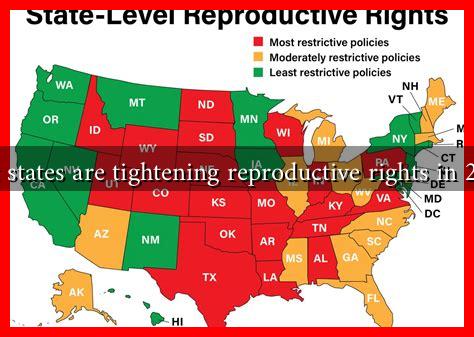-
Table of Contents
What States Are Tightening Reproductive Rights in 2023?
The landscape of reproductive rights in the United States has undergone significant changes in recent years, particularly following the Supreme Court’s decision to overturn Roe v. Wade in June 2022. As a result, many states have moved to tighten restrictions on reproductive health services, including abortion. In 2023, this trend has continued, with several states enacting new laws that further limit access to reproductive healthcare. This article explores the states that are tightening reproductive rights, the specific measures being implemented, and the implications for individuals seeking these services.
States Leading the Charge: A Closer Look
In 2023, several states have taken notable steps to restrict reproductive rights. The following states have enacted or proposed significant legislation aimed at limiting access to abortion and other reproductive health services:
- Texas: Texas has long been at the forefront of restrictive reproductive policies. In 2023, the state passed a law that bans nearly all abortions after six weeks of pregnancy, with no exceptions for rape or incest. This law has been met with widespread protests and legal challenges.
- Florida: Florida’s legislature approved a 15-week abortion ban in 2023, which is a significant reduction from the previous 24-week limit. The law has sparked debates about women’s rights and health care access.
- Idaho: Idaho has implemented a near-total abortion ban, with limited exceptions. The state has also introduced measures to penalize those who assist individuals in obtaining abortions, creating a chilling effect on reproductive healthcare providers.
- Oklahoma: Oklahoma has enacted some of the strictest abortion laws in the country, including a total ban on the procedure with few exceptions. The state has also seen an increase in anti-abortion legislation aimed at restricting access to contraceptives.
- Alabama: Alabama continues to push for stringent reproductive laws, including a total abortion ban that was passed in 2019 but has faced legal challenges. In 2023, the state has proposed additional measures to limit access to reproductive health services.
The Implications of Tightened Reproductive Rights
The tightening of reproductive rights in these states has far-reaching implications for individuals seeking reproductive healthcare. Some of the key consequences include:
- Increased Travel Distances: Individuals in states with restrictive laws may be forced to travel long distances to access abortion services, often leading to delays in care.
- Health Risks: Restrictive laws can lead to unsafe abortion practices, putting individuals’ health at risk. Studies have shown that access to safe and legal abortion significantly reduces maternal mortality rates.
- Economic Impact: The financial burden of traveling for reproductive healthcare can disproportionately affect low-income individuals, exacerbating existing inequalities.
- Legal Consequences: Individuals and healthcare providers may face legal repercussions for seeking or providing reproductive services, creating a climate of fear and uncertainty.
Public Response and Advocacy Efforts
The tightening of reproductive rights has sparked significant public outcry and advocacy efforts across the country. Organizations such as Planned Parenthood and the American Civil Liberties Union (ACLU) have mobilized to challenge restrictive laws and support individuals seeking reproductive healthcare. Grassroots movements have also gained momentum, with protests and campaigns aimed at raising awareness about the importance of reproductive rights.
In addition, some states are taking proactive measures to protect reproductive rights. For example, states like California and New York have enacted laws to safeguard access to abortion and expand reproductive healthcare services. These contrasting approaches highlight the growing divide in reproductive rights across the nation.
Conclusion: The Future of Reproductive Rights
The tightening of reproductive rights in several states in 2023 reflects a broader national trend that poses significant challenges for individuals seeking access to reproductive healthcare. As states like Texas, Florida, Idaho, Oklahoma, and Alabama implement restrictive laws, the implications for health, equity, and personal freedom are profound. Advocacy efforts and public response will play a crucial role in shaping the future of reproductive rights in the United States. As the landscape continues to evolve, it is essential for individuals to stay informed and engaged in the ongoing conversation about reproductive health and rights.
For more information on reproductive rights and ongoing advocacy efforts, visit Planned Parenthood or ACLU.




